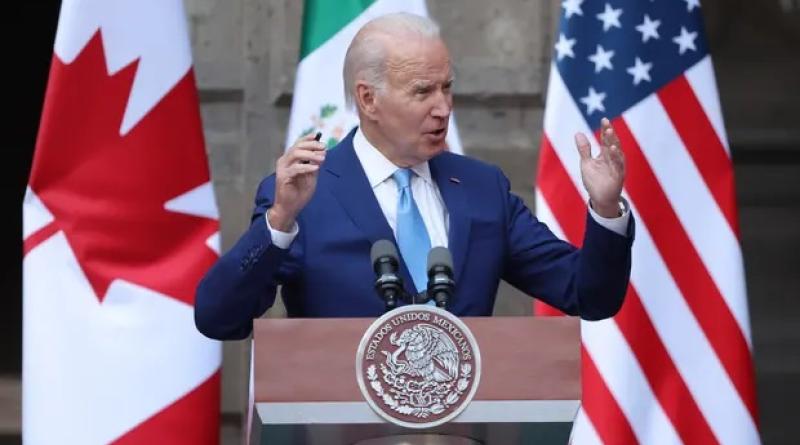Europe’s big players should copy Joe Biden’s green deal – not revert to old ways

The EU needs an ambitious climate strategy for industry. So why is Giorgia Meloni its chief supporter?
European governments have for many years basked in a sense of climate superiority over the US. We had the most ambitious climate goals; we were the constructive actor at Cop conferences; we had carbon-pricing mechanisms; and since 1990, we have reduced emissions by 28% against just 2% in the US. The US, by contrast, had climate-denying Republicans.
The Biden administration now has the world’s most generous package of climate incentives – a $370bn green subsidy package, which goes by the misnomer Inflation Reduction Act. But instead of celebrating the US handouts and tax breaks for investment in such things as electric vehicles and solar panels, many European governments are furious.
Yes, it’s good for the planet. But it’s even better for American industry as the new US green subsidies are only available for products “made in America”. The scale of financing is such that some European companies are already making plans to shift production across the Atlantic. Europe fears deindustrialisation and accuses the US of protectionism and unfair competition.
Just do the same, Washington argues. Develop your own green industrial policy and both sides of the pond can then lead the climate revolution together.
Europe should indeed understand that a great transformation is taking shape in the US. Not only is the climate crisis finally being taken seriously. But industrial planning – or what some now call the designer economy – is back in fashion across the political spectrum. This transformation opens a unique opportunity for Europe and the world.
The European Commission seems to understand this: along with a temporary relaxation of state aid rules to stimulate green projects, Brussels wants a joint European sovereignty fund to channel money to green industry. If taken seriously, this would trigger the emergence of a continent-wide industrial policy, accelerating Europe’s green transformation and the EU’s economic integration. It would place the first- and third-largest economies in the world on an equal climate-war footing, finally making emissions reduction targets a realistic prospect.
With the US now on board, this is no longer mere wishful thinking. But the ball is in Europe’s court. And if you think the Americans getting ahead of Europe on climate sounds like the world upside down, wait until you hear this: the main opponents of a bold response are the supposedly great Europeans Olaf Scholz and Emmanuel Macron – with the forever despondent Dutch premier, Mark Rutte. And the main supporter? The far-right nationalist Italian prime minister, Giorgia Meloni.
Germany, and to a lesser extent France, are foot-dragging on the commission’s ambitions. Germany’s finance minister, Christian Lindner, has firmly opposed repeating the Covid-era joint borrowing fund for climate purposes. The pandemic fund was intended as a one-off, he said, not the beginning of a federalised treasury.
Much better, Berlin argues, to simply allow each country to subsidise industry nationally as it sees fit. France agrees, and while it accepts the theoretical idea of a joint fund it suggests merely rebranding unspent pandemic money for the purposes of green investment.
This, however, would be no better than the economic nationalism that Europe accuses the US of. When the EU relaxed state aid rules for energy in response to the war in Ukraine last year, nearly 80% of new subsidies were found to have been dished out in Germany and to a lesser extent France. Authorising more national industrial subsidies would open the floodgates to beggar-thy-neighbour competition within the EU, with Germany and France, the biggest industrial players, siphoning off clean energy industry from the rest of the continent.
Italy’s Meloni, by contrast, demands that the EU act as a single economic power with a common industrial policy and joint funding to match. Of course, she hasn’t overnight become a European federalist. She simply understands that Italy’s national interest lies in a united response. Her Europeanism is the rational consequence of Italy’s fragile financial and geopolitical position. When EU leaders meet for a summit on 9-10 February, she will demand a common European climate policy, a common migration policy and a common plan for Africa.
Meloni’s reasoning on green investment applies to all EU countries. Divided, the 27 are bound to be bullied by foes and friends alike – the American Inflation Reduction Act is the clearest reminder of that. Without unity, the EU’s role as a world leader in the fight against climate change all but withers away. Allowing Meloni – who until recently was branded a fascist – to pass as the advocate of a united Europe is the undesirable consequence of protectionist thinking in Paris and Berlin.
European governments have a historic opportunity to join Washington in delivering a planetary industrial green strategy to prevent climate chaos. Their plan could embrace the 44 countries of the newly launched European Political Community, thereby including the UK and Turkey. Asia, Africa and Latin America could be included in the conversation early on to avoid replicating in the global south the industrial theft that the US is accused of inflicting on Europe.
The EU lobbied the US to join the climate struggle and wanted the new rightwing Italian government not to sow discord and division. On both accounts, it got its wish. It’s now time to deliver. The Green party shares power in Germany and Macron stands as a driver of European integration. Will they now pull Europe together around an ambitious climate plan, or will they let Meloni grandstand as the new Macron?
-
Lorenzo Marsili is a philosopher, activist and founder of European Alternatives and Fondazione Studio Rizoma. He is the author of Planetary Politics: a Manifesto
COVER PHOTO: ‘The administration of Joe Biden has now passed the world’s most generous package of climate incentives.’ Photograph: Héctor Vivas/Getty Images






